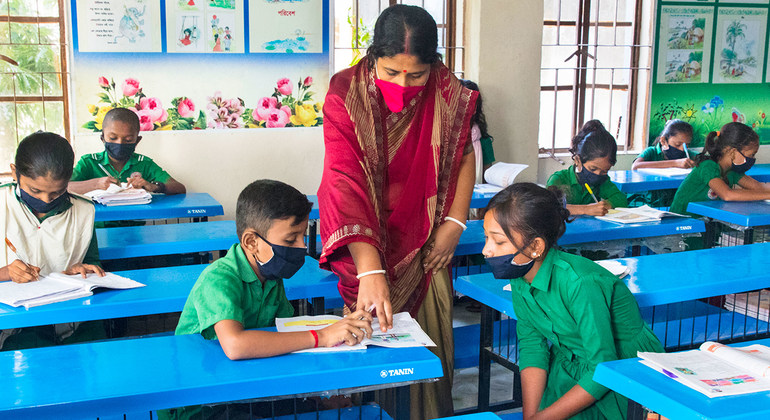
For the education system to recover from the COVID pandemic, it requires more investment in the well-being, training, professional development and working conditions of the world’s 71 million educators, UN agencies chiefs said on Monday, just ahead of World Teachers’ Day.
“Today we celebrate the exceptional dedication and courage of all teachers, their capacity to adapt and to innovate under very challenging and uncertain conditions”, said UNESCO head Audrey Azoulay, UN Children’s Fund (UNICEF) chief Henrietta Fore, top International Labour Organization (ILO) official, Guy Ryder, and Education International’s leader, David Edwards, in a joint statement.
Giving voice to teachers
World Teachers’ Day, celebrated annually on 5 October, provides an important opportunity to call on Governments and the international community to spotlight teachers and their challenges, and share effective and promising policy responses.
“They are the principal actors of the global education recovery efforts and are key in accelerating progress towards inclusive and equitable quality education for every learner, in every circumstance”, the statement continued.
From using technology creatively to providing socio-emotional support to their students, and reaching those most at risk of falling behind, teachers have been at the heart of the educational response to the COVID-19 crisis.
“Now is the time to recognize the exceptional role teachers play and to empower them with the training, professional development, support and working conditions they need to deploy their talent”, the top officials argued.
“Education recovery will be successful if it is conducted hand-in-hand with teachers, giving them voice and space to participate in decision-making”, they said.
Challenges abound
As of 27 September, schools have fully reopened in 124 countries, partially in 44 others, and remained fully closed in 16.
These figures highlight both the need for attention to teachers’ health and well-being as schools reopen, and for continued professional development to integrate and deploy successful educational technology.
According to UNESCO’s research, 71 per cent of countries have given some priority to vaccinating teachers, but only 19 included them in the first round of inoculations, while 59 other nations have not prioritized them in roll-out plans.
More effort is needed to support teachers where and when remote and hybrid teaching is still necessary.
Putting teachers at the heart of the education recovery – this year’s focus – will require increasing the size of the workforce.
Marking the day
To celebrate 2021 World Teachers’ Day, the conveners and partners, including the World Bank, the Global Education Coalition and civil society organizations, will organize global and regional events and an advocacy campaign with the participation of the UNESCO Global Network of Learning Cities.
The five-day series of events will include panel discussions and online sessions to examine effective policies, evidence and innovative practices to support teachers for successful recovery, build resilience and reimagine education in the post-pandemic world, and advance the fourth Sustainable Development Goal (SDG 4) of inclusive and equitable education.
- Just 40 per cent of countries trained three-quarters or more of teachers on technology related to distance learning during the pandemic.
- Only six out of ten countries provided teachers with professional development on psychosocial and emotional support.
- 58 per cent of countries provided teachers with content for remote learning, while 42 per cent provided them with ICT tools and ensured internet connectivity.
- Just under a third of 103 countries surveyed recruited additional teachers for school reopening, but the global gap remains high.
- 69 million more teachers are needed worldwide to ensure universal primary and secondary education by 2030 (SDG target 4.1)
- Sub-Saharan Africa is projected to need an additional 15 million primary and secondary teachers by 2030.